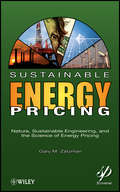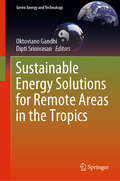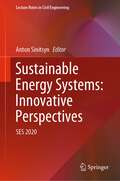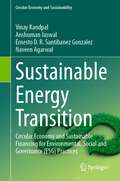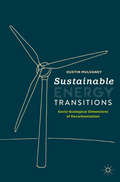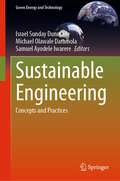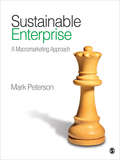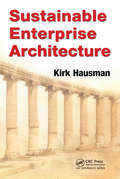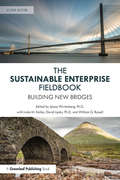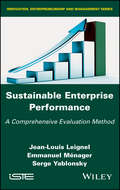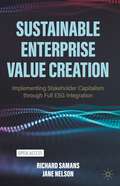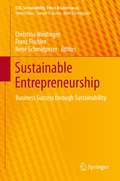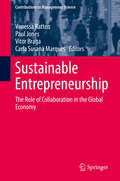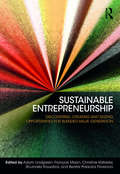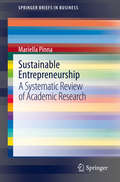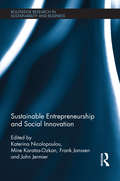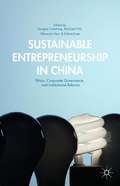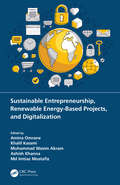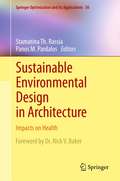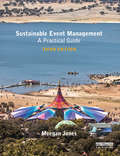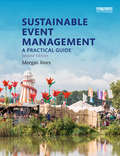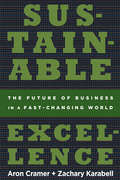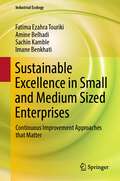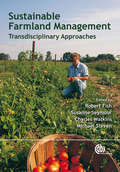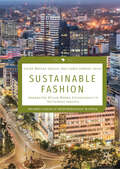- Table View
- List View
Sustainable Energy Pricing: Nature, Sustainable Engineering, and the Science of Energy Pricing
by Gary M. ZatzmanThe petroleum sector is possibly the largest and most dominant economic sector in the globalized economy. However, for reasons explored in this book, although none of the existing economic development models fit this sector in the past and apply even less today, no satisfactory alternative has presented itself. This book highlights the important reasons why current models fail to predict energy pricing with reasonable accuracy, and ventures into environmental and other problems with oil and gas production and associated economic decisions mounting across both developed as well as developing economies.
Sustainable Energy Solutions for Remote Areas in the Tropics (Green Energy and Technology)
by Oktoviano Gandhi Dipti SrinivasanThis book covers multifaceted aspects of sustainable energy solutions for remote areas in the tropics, particularly focusing on Southeast Asia. With insights from both the academic world and real-life implementation, readers will gain an overview of the range of energy problems currently facing the remote tropics, and what potential solutions are available. The book provides a detailed overview of various energy needs in the Southeast Asian tropics, a region where a significant portion of the population still lives without access to electricity. It not only addresses technical solutions to the energy problems but also tackles the social and wider implications, offering readers a more holistic understanding of the potential held by renewable energy. The chapters are structured to present first an overview of the problem at hand, and then a description of the technologies that could potentially solve it. Applications of the technologies; business models that are now available or being developed; the impact of the technologies; and future, more sustainable solutions are all discussed. Given its in-depth analysis, the book will be of interest to energy professionals in the tropics, energy policymakers, and students studying sustainable energy.
Sustainable Energy Systems: SES 2020 (Lecture Notes in Civil Engineering #141)
by Anton SinitsynThis book gathers the latest advances, innovations, and applications in the field of sustainable energy systems, as presented by researchers and engineers at the International Conference Sustainable Energy Systems: Innovative Perspectives (SES), held in Saint-Petersburg, Russia, on October 29-30, 2020. It covers highly diverse topics, including applications of renewable energy sources, recycling of solid municipal and industrial waste, circular economy based on agricultural waste, energy-efficient and sustainable buildings, innovation management and technologies of sustainable cities, sustainable construction, creative construction technology and materials, construction simulation and virtual construction, BIM and rapid prototyping for construction, consumption practices in the digital era, sustainable operations management, and supply chain management in the digital era. The contributions, which were selected by means of a rigorous international peer-review process, highlight numerous exciting ideas that will spur novel research directions and foster multidisciplinary collaborations.
Sustainable Energy Transition: Circular Economy and Sustainable Financing for Environmental, Social and Governance (ESG) Practices (Circular Economy and Sustainability)
by Vinay Kandpal Anshuman Jaswal Ernesto D.R. Santibanez Gonzalez Naveen AgarwalThe book offers a comprehensive overview of the challenges and opportunities associated with the transition to sustainable energy, circular economy, and sustainable financing for ESG practices. The publication is needed at this time because the world is facing urgent environmental and social challenges, such as climate change, resource depletion, and social inequality, which require a fundamental transformation of our economic and social systems. The transition to sustainable energy, circular economy, and sustainable financing for ESG practices offers a promising pathway to address these challenges and achieve sustainable development goals.The purpose of the publication is to provide a holistic and practical guide for policymakers, business leaders, investors, and other stakeholders who are interested in advancing sustainable energy, circular economy, and ESG practices. The book covers a range of topics, including the drivers of the transition, policy frameworks and regulations, technology and innovation, business models and financial instruments, and the role of stakeholders in facilitating the transition. It also emphasizes the importance of integrated approaches that balance economic, social, and environmental objectives, and provides practical examples and case studies of successful sustainable energy, circular economy, and ESG practices from around the world.The new contribution of this publication is its interdisciplinary and practical approach to sustainable energy, circular economy, and ESG practices. The book draws on the latest research from various fields, including economics, engineering, environmental science, and social science, and provides a synthesis of best practices and lessons learned from a diverse range of stakeholders, such as governments, businesses, and civil society organizations. The publication also provides a roadmap for how stakeholders can work together overcome the challenges of the transition and create a more sustainable and equitable future.The book is a timely and essential guide for anyone who is interested in advancing sustainable development goals. The book provides a comprehensive overview of the challenges and opportunities associated with the transition to sustainable energy, circular economy, and sustainable financing for ESG practices and offers practical solutions and case studies from around the world. Its interdisciplinary and practical approach makes it a valuable resource for policymakers, business leaders, investors, and other stakeholders who are committed to creating a more sustainable and equitable future.
Sustainable Energy Transitions: Socio-Ecological Dimensions of Decarbonization
by Dustin MulvaneyThis textbook introduces the key concepts that underpin sustainable energy transitions. Starting with the basic biophysical principles, current sources and environmental consequences of existing energy resource use, the book takes readers through the key questions and topics needed to understand, prescribe, and advocate just and sustainable energy solutions. The interdisciplinary nature of the book aims to build bridges across the social and natural sciences and humanities, bringing together perspectives, ideas and concepts from engineering, economics, and life cycle assessment to sociology, political science, anthropology, policy studies, the humanities, arts, and some interdisciplinary thinkers that defy categories. This accessible approach fills the gap for a textbook that integrates sustainability science and engineering studies with strong empirical social science and it will be a useful tool to anyone interested in the socio-ecological dimensions of energy system transitions.
Sustainable Engineering: Concepts and Practices (Green Energy and Technology)
by Israel Sunday Dunmade Michael Olawale Daramola Samuel Ayodele IwarereSustainable Engineering: Concepts and Practices provides insights into current perspectives on sustainable engineering research. It highlights the drivers, motivations, and challenges affecting the development and adoption of sustainable engineering in various sectors of the economy and how they impact sustainable development. Contributions from researchers representing multiple branches of engineering in academia, government laboratories, and industry present alternative approaches to traditional engineering practices. These approaches effect change, making the design, construction, production, and management of products, processes, and systems more environmentally friendly, socially beneficial, and economically profitable. The book will be a trusted reference for graduate students, practicing engineers, and other professionals interested in developing or using sustainable products and systems.
Sustainable Enterprise: A Macromarketing Approach
by Mark PetersonThis book is appropriate for the following courses: Sustainable Enterprise Sustainable Business Practices Sustainability Marketing Society Social MarketingSustainable Enterprise: A Macromarketing Approach goes beyond the internal firm strategies of micromarketing and the "four Ps" to take a broader perspective focused on the interconnectedness of markets, marketing, and society. In a globalized society concerned with social and environmental sustainability, this book encourages students to think critically about the opportunities and limitations of marketing, as well as its positive and potentially negative effects. Through the presentation of key research findings and actual company cases, Peterson engages students with questions such as: How do firms use sustainability concepts to navigate their firms in global business today? Why do markets change? How can firms conduct business profitably with the environment in mind? How can firms conduct business profitably with poor consumers in mind? Based on the premise that firms using holistic marketing strategies are better able to assess risks and identify opportunities, this text explains how firms can approach the marketplace to benefit the company, key stakeholders, and society at large. The result is a one-of-a-kind book that successfully explores macromarketing for sustainable enterprise.
Sustainable Enterprise Architecture
by Kirk HausmanEnterprise architecture requires an understanding of all technologies, strategies, and data consumption throughout the enterprise. To this end, one must strive to always broaden knowledge of existing, as well as emerging trends and solutions. As a trade, this role demands an understanding beyond the specificities of technologies and vendor products
The Sustainable Enterprise Fieldbook: Building New Bridges
by David Lipsky Jeana Wirtenberg Linda M. Kelley William G. RussellWith deep thought and inspiring examples, this updated book engages readers by increasing their understanding and awareness of what sustainability means conceptually, practically, personally, and professionally. It provides readers with the tools and techniques to improve the social, environmental, and economic performance of their organizations in both the short and long term. Since sustainability is not achieved in a siloed environment, everyone has a critical role to play on this journey. The Sustainable Enterprise Fieldbook engages today’s managers and leaders of organizations, in both the private sector and civil society, who are being challenged as never before to find ways to play a proactive role in understanding and addressing the risks and opportunities of sustainability. It teaches them how to apply systems thinking to turn our most intractable problems into exciting business opportunities, and offers ground breaking frameworks in new chapters on globalization, strategy, metrics, and sustainability models for collaboration, technology, and community. That is why this book is structured to be a fieldbook to provide practitioners the Activities, Cases, and Tools that they can use to help move their enterprise through progressively higher performing stages of sustainability. Readers will also gain access to the innovative Living Fieldbook: an online community forum filled with supporting materials.
Sustainable Enterprise Performance: A Comprehensive Evaluation Method
by Jean-Louis Leignel Emmanuel Menager Serge YablonskiSustainable Enterprise Performance details a method for evaluating an enterprise's readiness and progress toward sustainable performance through a comprehensive set of qualitative and quantitative indicators. <P><P> These indicators cover enterprise strategy for meeting both the impact of the enterprise within the framework of corporate social responsibility and the expectations of stakeholders, evolving and monitoring the product and service offerings and business processes. <P><P> The second half of the book focuses more closely on fundamental determinants of performance, such as digital transformation and artificial intelligence, corporate culture, ethics and compliance, branding and e-reputation and best-practice Lean management, and provides practical measures against which companies may assess the maturity of their sustainable performance.
Sustainable Enterprise Value Creation: Implementing Stakeholder Capitalism through Full ESG Integration
by Richard Samans Jane NelsonThis Open Access book provides a practical guide to the creation of sustainable enterprise value and implementation of the principles of stakeholder capitalism for corporate boards and management teams. The authors argue that business leadership is on the threshold of a new era driven by major shifts in technology, society, political economy and climate change. They set this transition in international and historical context and outline a comprehensive leadership agenda for fully integrating environmental, social, governance (ESG) and data stewardship risks and opportunities into corporate governance, strategy, reporting and partnerships. This systematic approach is illustrated with good practices by leading companies and includes an explanation of how sustainability reporting is making the leap into formal accounting standards set by the same body that oversees international financial accounting standards and what companies should do to prepare. The book’s combination of scholarly analysis and practical guidance make it a valuable resource for anyone seeking to navigate the new business context, whether from the perspective of a board director, C-suite executive, manager, policymaker, scholar or student.This is an open access book.
Sustainable Entrepreneurship: Business Success through Sustainability
by Franz Fischler Christina Weidinger René SchmidpeterSustainable Entrepreneurship stands for a business driven concept of sustainability which focusses on increasing both social as well as business value - so called Shared Value. This book shows why and how this unique concept has the potential to become the most recognised strategic management approach in our times. It aims to point out the opportunities that arise from putting sustainable entrepreneurship into practice. At the same time, this book is a wake-up call for all those companies and decision makers who underestimated Sustainable Entrepreneurship before or who are simply not aware of its greater dimension. Well structured chapters from different academic and business perspectives clearly outline how Sustainable Entrepreneurship contributes to solving the world's most challenging problems, such as Climate Change, Finance Crisis and Political Uncertainty, as well as to ensuring business success. The book provides a framework of orientation where the journey might go: What can a successful concept of SE look like? What are the key drivers for its realisation? What is the role of business in shaping the future of our society? The book also presents best practices and provides unique learnings as well as business insights from the international Sustainable Entrepreneurship Award (www.se-award.org). The Sustainable Entrepreneurship Award (short SEA) is an award for companies today who are thinking about tomorrow by making sustainable business practices an integral part of their corporate culture. Companies that receive the SEA are being recognised for the vision they have shown in combining economic and sustainable responsibility.
Sustainable Entrepreneurship: The Role Of Collaboration In The Global Economy (Contributions to Management Science)
by Paul Jones Vanessa Ratten Vitor Braga Carla Susana MarquesSustainable entrepreneurship focuses on how the environment is embedded within business practices. This book examines collaboration strategies and initiatives for sustainable entrepreneurs with a wide variety of partners, and demonstrates how they can be used to increase overall performance and achieve global competitiveness. Based on the latest empirical evidence from emerging economies, the book’s respective chapters address sustainability issues in connection with knowledge creation and learning, outsourcing, and the roles of universities, consultants, and the public sector.
Sustainable Entrepreneurship: Discovering, Creating and Seizing Opportunities for Blended Value Generation
by Adam Lindgreen Christine Vallaster François Maon Shumaila Yousafzai Beatriz Palacios FlorencioThe way organizations manage entrepreneurship has changed dramatically over the past decade. Today, organizations take account of economic issues, but they also adopt a broader perspective of their purpose including social and environmental issues (i.e. sustainability). Yet, despite its global spread, sustainable entrepreneurship remains an uncertain and poorly defined ambition with few absolutes. This book reaffirms the important need to improve comprehension and explore the subtleties of how individuals, groups, and organizations can discover, create, and seize opportunities for blended value generation, by designing and operating sustainable ventures. It examines, in an interdisciplinary fashion and across sectoral and geographical boundaries, how entrepreneurial activities can be developed to be generally consistent with sustainable development goals, as well as by whom, for what reasons, and with what implications. The Editors comprehensively review key dimensions of the sustainable entrepreneurship phenomenon to establish an essential definition and up-to-date picture of the field. The 19 chapters cover 4 main topics: Understanding the intentions and motivations for sustainable entrepreneurship Fostering and enacting sustainability through entrepreneurial action Leading and inspiring sustainable entrepreneurial action Finding the contextually grounded implications of and challenges to sustainable entrepreneurship and blended value generation This book is an important resource for entrepreneurs and policy makers as well as students in the fields of entrepreneurship, innovation, and sustainability.
Sustainable Entrepreneurship: A Systematic Review of Academic Research (SpringerBriefs in Business)
by Mariella PinnaThis book examines the current body of knowledge on sustainable entrepreneurship. Using network and content analysis, the author maps the structure of the research field and provides a systematic review. In this regard, network analysis is used to find evidence of thematically related clusters of publications and polarizing differences across the subfields of inquiry. In contrast, content analysis is employed to identify and address emerging gaps in the literature. In particular, after discussing mainstream contributions, the author focuses on pioneering research and predicts possible paths that might challenge researchers in the future. The author contributes to the ongoing debate on the definition and boundaries of the flourishing field of sustainable entrepreneurship, by offering critical insights and possible future development pathways derived from both quantitative and qualitative analyses.
Sustainable Entrepreneurship and Social Innovation (Routledge Research in Sustainability and Business)
by Katerina Nicolopoulou Mine Karatas-Ozkan Frank Janssen John M. JermierSustainable entrepreneurship has attracted growing attention in both scholarly and practitioner circles. Focusing on generating social, environmental and business value, the notion has been raised more recently to address the contribution of entrepreneurial activities to sustainable economic and social development.Sustainable Entrepreneurship and Social Innovation builds on a theoretical framework that addresses related topics via a combination of insights from sustainability, policy, managerial, strategic, innovation and institutional perspectives. Providing empirical casework as well as a conceptual and theoretical framework, the book takes a global, interdisciplinary approach to the emergent field of sustainable entrepreneurship. The book highlights elements of sustainable entrepreneurship which have a societal impact as well as regional relevance and related aspects of innovation are also presented. Definitional issues are further elaborated in order to encompass the main inter-connected fields of study, sustainable entrepreneurship and social innovation.This book is an important resource for academic researchers, and postgraduate and advanced undergraduate students in the fields of entrepreneurship, innovation and sustainability.
Sustainable Entrepreneurship in China
by Douglas Cumming Michael Firth Wenxuan Hou Edward LeeThere is an intense love–hate relationship between entrepreneurship and business ethics, and transitional economies provide fertile ground to examine these issues, especially within emerging markets. While institutional reform and governance assist entrepreneurship, the competition among Chinese entrepreneurs also serves as catalysts for further reform and governance improvement. Therefore, there is an interrelationship between business ethics, entrepreneurship, corporate governance,and institutional reform associated with China's past, current, and future economic development. Sustainable Entrepreneurship in China provides empirical evidence and cutting-edge research into topical business ethics issues relating to entrepreneurship, corporate governance, and institutional reforms in China. As a leading emerging economy, analysis of Chinese data provides useful policy implications for China, as well as other developing economies, on the ethical aspects of talent acquisition, venture capital investment, and corporate governance.
Sustainable Entrepreneurship, Renewable Energy-Based Projects, and Digitalization
by Amina Omrane Khalil Kassmi Muhammad Wasim Akram Ashish Khanna Md Imtiaz MostafizSustainable Entrepreneurship is nowadays considered as a discipline at the cross-roads of many others. This book describes recent cases, techniques and tools proposed for leaders, entrepreneurs, and practitioners who are involved and responsible for making strategic decisions in their companies and aiming at sustainable development. This book highlights the use of new business models/methods that can be employed by organizations and researchers to save millions of dollars, to enhance the economic growth, as well as to resolve environmental and social issues, via sustainable networks, renewal energy distribution, and social/green entrepreneurship. It will provide a comprehensive discussion of practical techniques, like Machine Learning, Robotics, Photovoltaic solar energy, in the field of renewable energy, and other digital tools, such as digital marketing, crowdsourcing platforms, and digital currency. Meanwhile, it will enlighten the way for entrepreneurs and decision makers by helping them to learn how to grow their business. The focus will be on how to benefit from these techniques to develop sustainable and renewable energy-based projects, as well as digitalized new ventures. The book walks the reader through the latest emerging trends in digitalization that can support practitioners, managers, entrepreneurs, and researchers to help them appreciate the application of sustainable solutions in various functional domains.
Sustainable Environmental Design in Architecture: Impacts on Health (Springer Optimization and Its Applications #56)
by Panos M. Pardalos Stamatina Th. RassiaOver the last few decades, there have been dramatic improvements in the understanding and research of environmental design. Numerous methods have been developed to enhance architectural design in order for it to be more energy efficient, sustainable and health enhancing. This book presents several theories and techniques that can be used to improve how buildings are engineered and designed in order to utilize more sustainable construction methods while promoting the health of the building's occupants. Contributions to the study of environmental design have come from a diversity of fields including applied mathematics, optimization, computer science, medical research, psychology, management science, architecture, and engineering. The techniques developed in these areas of research can be used to increase building performance, occupant satisfaction, productivity, and well being, and reducing the incidence of health conditions and chronic diseases related to the use of a designed space. This book provides architectural practitioners, civil engineers as well as other interdisciplinary researchers with the techniques needed to design, implement, and test for sustainability and health promotion in new or existing structures.
Sustainable Event Management: A Practical Guide
by Meegan JonesAcross the world each year events of every shape and size are held: from community events, school fairs and local business functions through to the world’s largest festivals, music events, conferences and sporting events. As well as causing celebration and giving voice to issues, these public parties use up resources, send out emissions and generate mountains of waste. Events also have the power to show sustainability in action and every sustainably produced event can inspire and motivate others to action. Written by a leader in event sustainability management, this book is a practical, step-by-step guide taking readers through the key aspects of how to identify, evaluate and manage event sustainability issues and impacts and to use the event for good – it's for events of any style and scale, anywhere in the world. Now in its third edition, this is the indispensable one-stop guide for event professionals and event management students who want to adjust their thinking and planning decisions towards sustainability, and who need a powerful, easy-to-use collection of tools to deliver events sustainably.
Sustainable Event Management: A Practical Guide
by Meegan Lesley JonesGatherings of people for a purpose always have and always will be a part of the human story. Those staging these events have a social and environmental responsibility to manage their impacts and enhance their positive lasting legacies. Written by a leader in the field, this book is a practical, step-by-step guide taking readers through the key aspects of how to identify, evaluate and manage event sustainability issues and impacts - for events of any style and scale, anywhere in the world. The product of tried-and-tested methods, coverage includes numerous examples and case studies from across the world, such as Boom (Portugal), Bonnaroo (USA), Hurricane (Germany), and Glastonbury (UK) Festivals. Readers are provided with checklists for action and tools for measuring performance. This updated second edition includes a detailed review of the new international standard ISO 20121 Event Sustainability Management Systems along with other recent standards and certifications. It expands detail on measuring and reporting event sustainability performance outcomes with explanation of the Global Reporting Initiative Event Organizers Sector Supplement performance indicators. This is the indispensable one-stop guide for event professionals and event management students who want to adjust their thinking and planning decisions towards sustainability, and who need a powerful, easy to use collection of tools to deliver events sustainably.
Sustainable Excellence: The Future of Business in a Fast-Changing World
by Zachary Karabell Aron CramerHow the world's most influential companies are building business strategies that tackle the biggest global challenges.Today's business landscape is changing in fundamental ways: Natural resources are growing ever more scarce and expensive. Technology and changing consumer expectations are making transparency a fact of life. The rise of emerging economies creates vast market opportunities for companies--and better living standards for hundreds of millions. In Sustainable Excellence, Aron Cramer and Zachary Karabell tell the stories of the companies who are transforming themselves by responding to these paradigm shifts and in the process shaping the future.From their work with these Global 1000 companies, Cramer and Karabell know firsthand how business can successfully grapple with big-picture issues like resource scarcity, supply chain complexities, and the diverse expectations of government and the public. In Sustainable Excellence, they tell the story of how Coca-Cola and Greenpeace collaborated on a refrigerator that fights climate change. They show how companies like Best Buy and Nike are transforming the very products they sell to deliver more value to consumers with less waste. They recount how GE and Google created an innovative partnership that is developing "smart grids" that radically reduce energy use. And they show how business leaders like Starbucks' founder and CEO Howard Schultz put sustainable excellence at the center of his company's business strategy.Through these and other fascinating stories, Sustainable Excellence makes the case for a different way of doing business--one that will define both business success and economic vitality in the 21st century.
Sustainable Excellence in Small and Medium Sized Enterprises: Continuous Improvement Approaches that Matter (Industrial Ecology)
by Fatima Ezahra Touriki Amine Belhadi Sachin Kamble Imane BenkhatiThis book is a collection of the up-to-date experience and knowledge about the implementation of sustainable business excellence in a particular context of SMEs. The book uses empirical and practical approach to tackle this issue, which is underdeveloped in the literature. Hence, it could constitute a relevant reference for SMEs managers seeking to manage their operations sustainably, efficiently and resiliently. The book also integrates the smart component to the sustainable business excellence and proves for those who are still skeptical that SMEs could benefit from smart and digital technology in the favor of sustainability and business excellence. Overall, we build on successful initiatives we experienced in real life to guide SMEs in order to be sustainable smart and resilient in the post COVID context which is highly demanding in terms of business excellence and efficiency.
Sustainable Farmland Management: Transdisciplinary Approaches
by Robert Fish Charles Watkins Michael Steven Susanne SeymourExamining the relationship between sustainability and farmland management in differing temporal, spatial and production contexts, this book considers farmland multifuctionality, systems and systemic thinking, the debates over information, knowledge and ethical aspects.
Sustainable Fashion: Empowering African Women Entrepreneurs in the Fashion Industry (Palgrave Studies of Entrepreneurship in Africa)
by Carme Moreno-Gavara Ana Isabel Jiménez-ZarcoThis book analyzes female entrepreneurship in the textile sector in Africa as a phenomenon that favors the social integration and economic development of women in certain geographical areas. It identifies entrepreneurship as an avenue through which women can escape the feeling of being trapped in the home and assert their independence while providing for their families. In the field of fashion, female entrepreneurs in resource-rich Africa have significant opportunities through knowledge of natural resources and cultural traditions, as the use of natural fabrics and original designs is one of the latest trends. This book provides a framework for how African women can develop sustainable fashion enterprises, offering an original and lasting contribution to the field of entrepreneurship.
